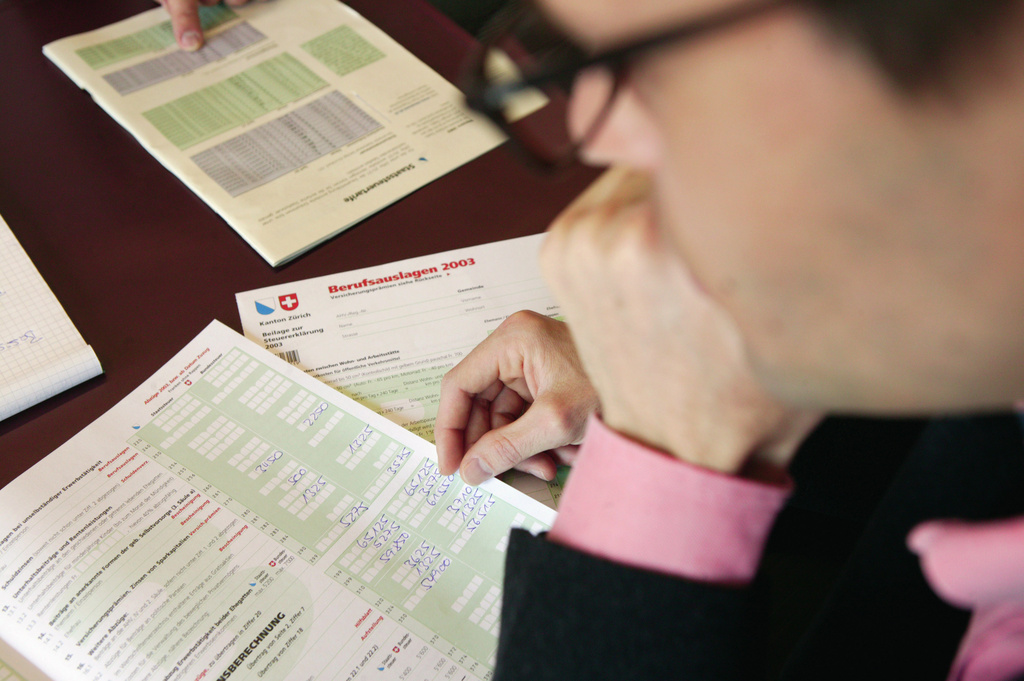Swiss cantons catch the tax “fever”

Switzerland has decided to follow France and Italy in pardoning tax cheats, with some cantons going further than the government in trying to recuperate money.
While Swiss citizens prepare for the annual chore of filling out their tax declarations, they have the chance to make amends for any wrong-doing in past years.
Those who have cheated the system can declare all their financial assets without a fine or legal proceedings, provided they pay back tax and other related interest payments.
This measure, approved by parliament in the spring of 2008, is considered “amoral” by some who feel it favours the cheats and “too weak” by others who feel that only a general amnesty, with an attractive tax rate (between five and 15 per cent), will be enough to bring in major amounts.
Tax specialist Marco Bernasconi, who teaches at the University of Applied Sciences and Arts of Southern Switzerland, belongs to the second group. “All it needs is a simple change in the federal law to bring in such an amnesty,” said Bernasconi, who has been campaigning for such a measure for a number of years.
Henry Peter, a Lugano lawyer and professor of business law at Geneva University, said recently that a general federal amnesty would help more than SFr200 billion ($196.5 billion) in assets come to light in Switzerland.
Amnesty not expensive
The fact is that a tax amnesty is not expensive and the benefits can be enormous. This is a message that some Swiss cantons have fully understood. They have been inspired by the Italian model which lasts until April 30 and which may repatriate about €125 billion (SFr184.5 billion).
Canton Jura was the first to make a move and declare an amnesty with goes far beyond that of the government because it allows cheats to present an estimation of revenues concealed without any obligation to present any documentation.
The authorities hope to see a third of concealed assets come to light – about SFr300 million. It’s manna from heaven for the cantons, whose finances have been on the decline, and a guarantee of increased revenues for the years to come.
The federal authorities have criticised canton Jura for, in their view, going too far and flouting federal legislation on the issue.
The tax amnesty issue is also being debated in canton Fribourg. Just before Christmas, the centre-right Christian Democrat Jean-Louis Romanens asked the local government if it intended to follow the movement launched by canton Jura. Claude Lässer, the Fribourg finance director, is due to give his answer in February.
Boost regional economies?
Apart from the advantage of extra tax revenue, the supporters of an amnesty believe the arrival of such money could boost regional economies considerably.
“Not so,” says Sergio Rossi, a professor of economics at Fribourg University. “With the threat of unemployment, caution is the order of the day and those who have admitted tax cheating are instead going to invest their money in the financial sector or in real estate. They certainly won’t spend on consumer goods.”
As far as Ticino is concerned, Rossi even sees a counterproductive effect. “An amnesty distorts the debate and only delays real discussion on the change of structure of the local financial industry, which has proved to be too focused on wealth management.”
He fears other cantons may be tempted by this amnesty “fever”.
“These measures are populist because they allow politicians to show the electorate that they are doing something for the regional economy. In reality they are just carried out in a rush and have no effect on basic structures,” he said.
“Tax amnesties are admissions of weakness of a democratic state which hasn’t been up to the tasks with which citizens have entrusted it.”
Whether they are good or bad solutions, there seem to be a number of technical problems associated with them, which are already causing headaches for some cantonal authorities.
And some experts wonder what sense it makes to have such an amnesty which applies to only one of the three Swiss tax components that include the government and the communes.
Nicole della Pietra, swissinfo.ch (Adapted from French by Robert Brookes)
Italy’s parliament voted for a third tax amnesty in nine years in October.
Tax dodgers who came forward anonymously will receive the relatively light one-off tax rate of 5%.
Italians with accounts within the European Union, along with other countries such as the US, Japan, Mexico and Australia, can keep their funds at those banks. But clients of Swiss banks have been told they must return their assets to Italy.
The United States and Britain are among other countries that are operating, or have recently staged, tax amnesties.
Direct taxes are not only levied at federal level, but also by the cantons. Based on the tax laws of their canton, the communes also levy direct taxes.
For the time being, only the Catholic cantons of Jura, Ticino and to a lesser extent Fribourg have shown an interest for a cantonal tax amnesty.
In canton Jura, the authorities hope that the money disclosed will bring in tax revenues of SFr3 million a year to the canton and SFr2 million to the communes.
Ticino authorities are set to make a decision on a parliamentary initiative on the issue in the near future.
According to centre-right parties in Ticino, SFr1 billion could appear, with SFr65 million going into the canton’s coffers.
It is not clear how much the federal tax amnesty will bring in. The last such exercise in 1969 helped uncover SFr11.5 billion.

In compliance with the JTI standards
More: SWI swissinfo.ch certified by the Journalism Trust Initiative












You can find an overview of ongoing debates with our journalists here . Please join us!
If you want to start a conversation about a topic raised in this article or want to report factual errors, email us at english@swissinfo.ch.